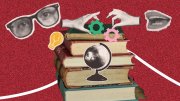Last Sunday’s New York Times Magazine had a profile of Lewis Hyde, a scholar who’s made a life of following ideas that interest him.
Hyde, a tenured professor of creative writing at Kenyon College in Ohio, is a fellow this year at Harvard’s Berkman Center for Internet and Society, where he is working on a book about the concept of the “cultural commons” and intellectual property in the digital age.
If the quotations from the book draft that appear in the article are any indication, Hyde will connect new-media forces like Napster and Wikipedia with America’s cultural and political past, including historical figures such as Emerson, Thoreau—another subject of study for Hyde—and Thomas Jefferson. In the tension between protecting the rights of authors and artists, on the one hand, and opening up ideas and works of art to a wide audience and creative reuse, on the other Hyde sees parallels with the tension between the private-property rights of individuals and the need to preserve some land for public use and enjoyment.
Hyde believes U.S. copyright law has gone too far in the direction of protecting rights—a claim he illustrates by using Harvard University Press’s handling of Emily Dickinson’s poems as an example. Hyde (according to article author Daniel B. Smith) believes that
the last 20 years have witnessed a corporate “land grab” of information—often in the guise of protecting the work of individual artists—that has put a stranglehold on creativity, in increasingly bizarre ways. Over dinner not long ago, he told me about the legal fate of Emily Dickinson’s poems. Dickinson died in 1886, but it was not until 1955 that an “official” volume of her collected works was published, by Harvard University Press. The length of copyright terms has expanded substantially in the last century, and Harvard holds the exclusive right to Dickinson’s poems until 2050—more than 160 years after they were first written. When the poet Robert Pinsky asked Harvard for permission to include a Dickinson poem in an article that he was writing for Slate about poetic insults, it refused, even for a fee. “Their feeling was that once the poem was online, they’d lose control of it,” Hyde told me.
Hyde, a 1991 MacArthur Fellow, is a polymath who took a roundabout route to writing a book about copyright law. As a teenager, he was an aspiring geologist; attending the University of Minnesota in the 1960s, he settled on a vocation as a poet. He enrolled in a comparative literature graduate program at the University of Iowa, but then, “bored by academia, quit and moved to western Minnesota to write.” His career path’s twists and turns continued from there, Smith writes:
It was in its way as much a move to the literary wilderness as was Thoreau’s move to Walden. To make ends meet, Hyde worked as a carpenter and bluffed his way into a job as an electrician at a mobile-home factory. He eventually headed East, following a girlfriend—and was unceremoniously dumped while standing at a pay phone in West Virginia. Unmoored in Boston, armed with only a youthful bravado and an essay he wrote about schizophrenia titled “The Tuber Mind,” Hyde presented himself at the psychiatric ward at Cambridge City Hospital and announced, “I’m here to be your poet in residence!” He was hired as the night guy on the drunk ward.
Strangely, the job marked the beginning of Hyde’s lifelong study of the roots of the creative imagination, and of his literary ascent. At the time, [John] Berryman was writing and publishing his landmark Dream Songs. In the anguished, self-pitying tone of the poems, Hyde heard an echo of the tales spun by the residents on the ward, and he wrote a long essay drawing the parallel. “Alcohol and Poetry: John Berryman and the Booze Talking,” published in 1975, was widely anthologized and widely debated. More important, it won Hyde a $7,500 grant from the National Endowment for the Arts, which he lived on for a year and a half as he haunted libraries, tramped around and tried to figure out what he wanted to do next, and how. “I worked on how I work” is how he puts it.
At the time, Hyde’s passion for poetry was quickly being matched by a passion for cultural anthropology, particularly the writings of Ivan Illich, an Austrian priest-cum-social-critic who drew wide public attention for his book Deschooling Society (1971)—a polemic against modern public education. Hyde traveled to Cuernavaca, where Illich ran a language center and salon for Western missionaries heading to Latin America. It was Illich who lent Hyde a book of anthropology that contained a chapter about Marcel Mauss’s essay on gift exchange. Hyde’s intellectual course for the next several years was set.
This experience led to Hyde’s influential 1983 book The Gift. Perhaps his most widely known work, the book draws on the anthropological literature of gift exchange to argue that art should be considered not a commodity (valuable because it fetches a high price at an auction) but a gift—something that gains value through being continually circulated. This, too, is an example, Smith writes, of Hyde’s ability to pull in ideas from all over the place and tie them together somehow:
In the course of 12 pages in “The Gift,” Hyde hops from a discussion of a Pali Buddhist parable to Marx’s “Capital” to the Ford Pinto and then moves quickly on, in the next 3 pages, to Christmas, country-western music and the psychological fates of Vietnamese refugees in Southern California.
Read the whole article here; find out more about Hyde on his website here.








